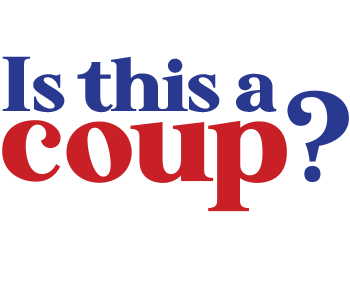A coup is in progress, but has not been consolidated.
The President of the United States is in the process of placing the entirety of the Federal government under his own control using methods that are in direct violation of the U.S. Constitution.
This is a coup.
Coup leaders consolidate power by seizing control of key government agencies, media, infrastructure, and financial institutions.
Often, the military has been used to take control, but that is not the only method: Controlling institutions is the key to a successful coup.
Modern countries run on money and data, so controlling both is key. Trump/Musk have not yet consolidated control, but they are targeting the key financial and information systems of the United States.
There is still time to resist, but real damage is being done to the systems that the United States is dependent on for day-to-day operations.
Things are moving fast. President Trump is working to disempower Congress and the federal courts, seize control of independent agencies, and stifle free speech. A summary of the current (as of March 2025) lines of attack:
Deport non-citizens with no requirement to produce evidence of wrong-doing.
Slash government programs that Congress created and funded.
Control what university faculty and students are allowed to say.
Harass and ignore federal judges.
See below for the latest significant developments.
Updates
Our team monitors verified news stories about events that indicate that a coup is being planned or attempted. We watch for trends and momentum when considering when to move the Coup-o-meter either toward a coup or toward democracy.
We recommend looking to the resources below for regular updates and analysis, and if you believe in the United States, it is time to have the back of those people who are making this country work.
Organizations
News and analysis
Of course it’s a coup Timothy Snyder
Is It Really a Coup? Joyce Vance
Elon Musk’s Power Grab Is Lawless, Dangerous, and—Yes—a Coup Slate
Yes, It’s a Coup and Yes, It’s Targeting You The Daily Beast
Federal Worker Support and Organizing
Alt National Park Service originally emerged as a response to the Trump administration's suspension of the National Park Service's Twitter account in 2017. Now, they are building a coalition of over 92,000 federal employees. Follow them for news and updates.
The Justice Connection (Currently taking donations) isbuilding a network of DOJ alumni to provide employees with practical support, including legal services, whistleblowing guidance, and help managing online harassment.
GI Rights Hotline provides accurate, helpful counseling and information if you are being ordered to violate the Constitutional rights of US citizens.
FedOath (Currently taking donations) is a vetted legal defense fund that supports all levels of federal employees that have been unjustly and illegally fired.

What is a coup?
A coup is the undemocratic seizure of power.
Is this a coup?
This is the second undemocratic attempt to seize power in the United States. We covered the first coup attempt in 2020-2021 in the original Is this a coup website. See the archive here.
This attempted coup is different than the previous attempt in that Trump is the head of the executive branch, but he is attempting to use unconstitutional means to overturn the separation of powers between the executive, legislative, and judicial branches.
What makes a coup successful?
Coup leaders rely on two critical factors, both of which they must obtain from their citizens: legitimacy and cooperation.
Legitimacy means that the public believes that the coup leader has the right to their position.
Cooperation means that the people who actually make the country function – from poll workers to police, elected officials to journalists – go along with the orders of the coup leader.
Additionally, the success of a coup often turns on momentum: the popular belief that a coup attempt will succeed. Everyone from legislators to the media to the general public are less likely to resist when they feel that the tide is turning toward a successful coup.
Spread the word on Instagram
Resources
Find out more about coups, defending democracy, and civil resistance:
We relied heavily on The Anti-Coup by Gene Sharp and Bruce Jenkins for the writing of this website and design of the Coup-o-Meter.
Civil Resistance Against Coups by Stephen Zunes
Training Manual for Nonviolent Defense Against the Coup d'Etat by Richard Taylor (also available in Spanish)
A project of Dissent Pins
This is a project of Dissent Pins. We are designers and organizers who create tools and actions to support organizations working for a more just and democratic world.
We also make things.
See some of our previous projects here.






